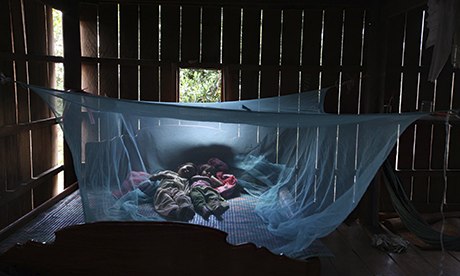Investigation finds two international companies paid Cambodian officials for deals to supply anti-malaria bednets
theguardian.com,
 |
| A family rest under a bednet treated with insecticide in Prey Mong kol village in Pailin province, Cambodia. Photograph: Paula Bronstein/Getty Images |
The Global Fund to Fight Aids, Tuberculosis and Malaria has
suspended contracts with two international firms that supplied mosquito bednets
over "serious financial wrongdoing" in Cambodia.
Contracts with Vestergaard Frandsen and Sumitomo Chemical
Singapore were suspended on Thursday pending a full review after a
two-and-a-half-year investigation.
A report published by the Global Fund's office of the
inspector general found that between 2006 and 2011, the suppliers paid
commisions to two Cambodian officials from the National Centre for
Parasitology, Entomology and Malaria Control (CNM), totalling $410,000 (£304,534),
in return for awarding contracts for insecticide-treated bednets, which help
prevent the spread of malaria.
The report also cited "improper charges and
manipulation of procurement practices" at two other organisations, which
brought the total amount involved to about $431,000.
The Global Fund's sanctions panel, which includes internal
and independent experts to evaluate cases of wrongdoing, recommended that the
two suppliers named in the report be suspended pending a full review of the
case. The investigation found that all the mosquito nets procured by the grant
had been provided.
"We cannot tolerate unethical conduct anywhere,"
said Mark Dybul, the Global Fund's executive director. "Although this case
had no direct impact on Cambodia's fight against malaria, taking commissions in
exchange for contracts violates our mission of public service. We remain fully
committed to pursuing fraud and taking action when we find it."
The fund, which is due to hold a replenishment event in
December, said Vestergaard and Sumitomo had "both fully co-operated with
the investigation", and had taken action against the employees involved,
as well as steps to prevent similar incidents in future.
At the time of publication, neither company was available to
comment.
The Global Fund has disbursed $331m to support HIV, TB and
malaria programmes in Cambodia since 2003. Since then, Cambodia has seen an 80%
drop in malaria deaths, a 45% fall in TB cases and a 50% decline in HIV
infections.
Over the past few years, the fund has sharpened its
procedures to investigate allegations of corruption and fraud among recipient
countries. Serious allegations of financial mismanagement prompted Germany to
suspend its donations to the fund at the beginning of 2011, sparking concerns that
other donors may follow suit.
In a statement published on Thursday, the fund said that
over the past two years, it had taken "multiple actions to protect its
investments by significantly strengthening deterrence and minimising the risk
of abuse".
"A new framework for procurement was established, with
a comprehensive approach to ensure all bulk purchasing is consistently
undertaken in a fair, transparent, lawful and ethical manner," it added.
The organisation has also faced a gaping hole in funding, which
led to the cancellation of its 2011 to 2013 round of grant-making.
In December, the fund will hold its fourth replenishment
round, where it hopes that donors will pledge the $15bn (£9.3bn) it needs
between 2014 and 2016. In September, the UK promised £1bn over three years on
condition that other donors step up. The US has promised $1.65bn in its 2014
budget; Sweden, Norway, Finland, Denmark and Iceland have already pledged
$750m.
Over the past year, the fund has held several meetings with
donors to highlight its value for money. The organisation was set up in 2002 as
a public-private partnership to focus on tackling three of the world's major
diseases.

























1 comment:
in cambodia, mosquito nets like this can help save life from malaria. i think every family in cambodia should have mosquito nets to protect them and their family. thank you.
Post a Comment